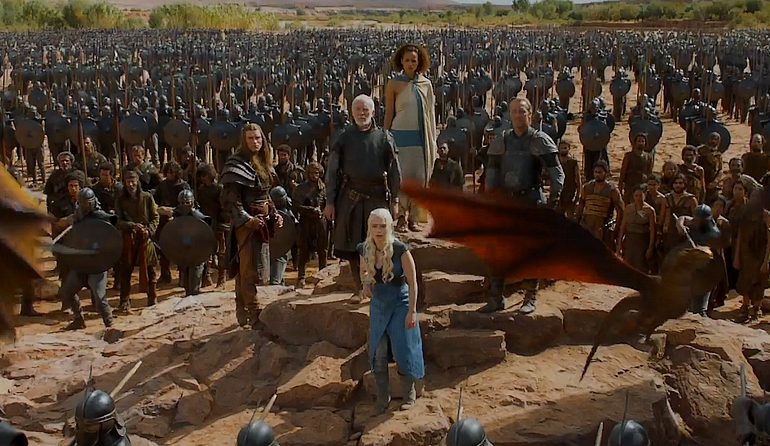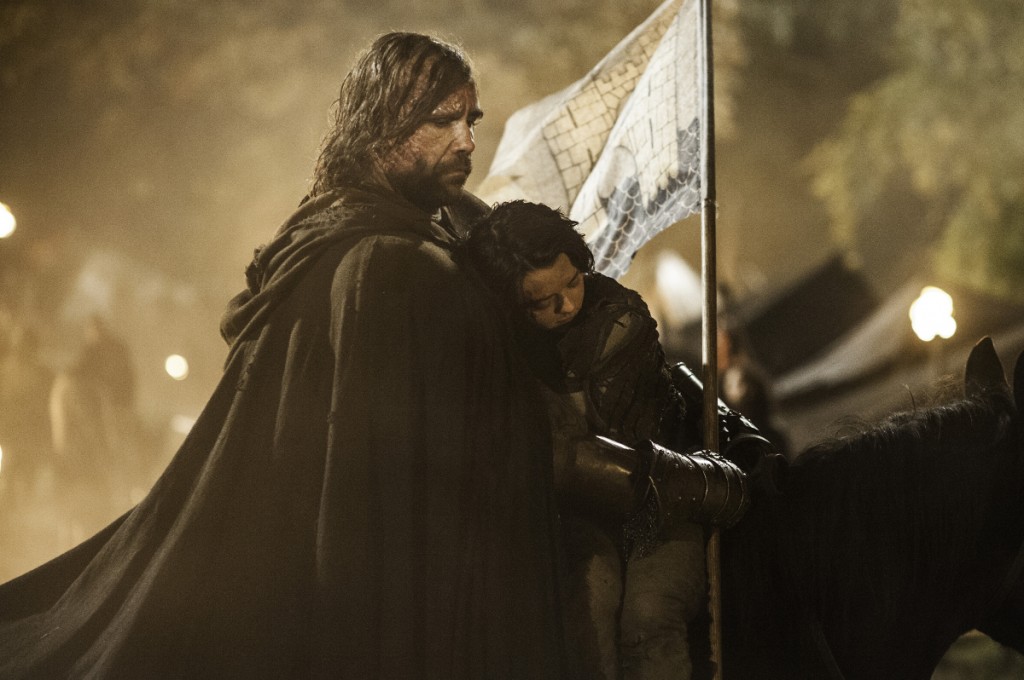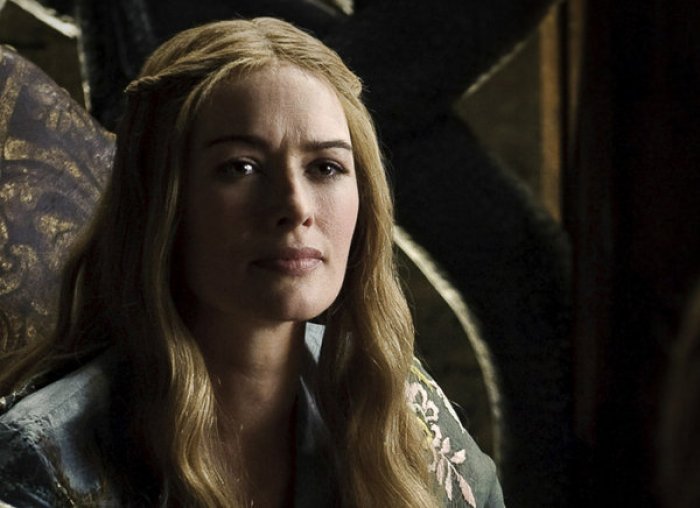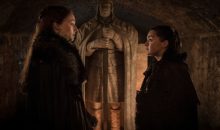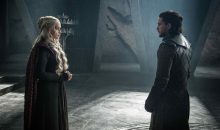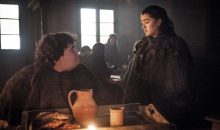Game of Thrones: Mhysa
There’s one real issue with Game of Thrones’s habit of making Episode 9 of each season a powerful, high-budget shocker – they have to follow it up. Season finales tend to lean more towards setup than on other prestige dramas, which works well with the overarching nature of the story. But “Mhysa” had a hard row to hoe, both following up the powerful “Rains of Castamere” and trying to put a season cap on a story that’s actually at its midpoint – about 60% of the way through A Storm of Swords, at a glance.
And it’s hard to rate it a full success. There were a couple big missed opportunities, an ending sequence that certainly didn’t live up to the last two years, and some scenes that really just seemed excessive use of screen time. Yet “Mhysa” also had a level of thematic cohesion that was missing from other episodes this year, and served as something of a come-down; an after-dinner scotch after we gorged ourselves on Holy-Shit-Quotient last week.
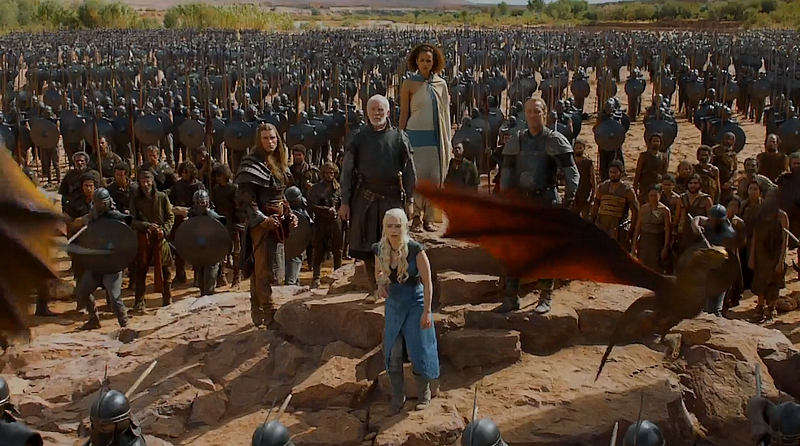
The new album from KHALEESI, with Dany on vocals, Daario & Jorah on guitar, Missandei on keyboards, Barristan on bass, and Grey Worm on drums.
Let’s start with that ending sequence, and get it out of the way. I was thinking all along that we’d end “Mhysa” on a scene involving the Brotherhood Without Banners and the reintroduction of a certain character (you know what’s up, book fans); it would fit in with the previous theme of “end the season with magic” and sort of split the difference between fire & ice. The choice to forestall that to Season 4 is an odd one; it seemed tailor-made and a spectacularly eerie cliffhanger, but I’m sure there were perfectly good reasons. (?)
Instead, we got a scene that was, well…I don’t like to go looking for things to be angry about, but that shot was a bit racially problematic. Daenerys’s journeys in Essos have done a good job of driving home the idea that all of GoT‘s cultures are equally prone to honor & vileness, just not dressed up in the familiar European-influenced chain-mail-and-heraldry of Westeros. In fact, the opening shot of that ending sequence, with Dany’s multicultural band of advisors perched on a rock, was a neat contrast after a whole episode of white folks. But then came the Targaryen Freedom Rave, a single pale savior in the midst of a sea of thankful brown people; it was very visually striking, but had some uncomfortable associations. One hopes that Season 4 can avoid lazily going to that well and give the cities of Slaver’s Bay* the depth and agency they’ve extended to other areas.
(*Maybe they can start by calling it something different. I don’t know why that bothers me in the show but not in the books. Maybe because the Ghiscari extras appear to be cast with actors of Arabic descent, whereas in print they’re a wholly invented fantasy culture. )
It’s unfortunate that “Mhysa” botched the landing a little, given how strong it started. Having Roose Bolton (now promoted to #2 villain of the show) overlooking the carnage with the knife that killed his king in hand was a good start, but then, well, the bastards went and showed us what the books only discussed. The image of Grey Wind’s head sewn to Robb’s mutilated body was one of the most chilling things George R.R. Martin ever provided, and while fans have come up with a few illustrations, none could match the gruesome horror of seeing it on screen. And Arya, unlike the books, saw it – saw the banners burning, the northmen dying, and what the Freys had done to her brother.
That might seem a little over-the-top, but it feeds into the consistency that gives “Mhysa” strength despite its occasional flops. Season 3 of GoT has seen the North break, the South bend, and everyone else just get out of the way, for the overwhelming will of Tywin Lannister. It’s easy to be impressed by Tywin given the way that Charles Dance brings him to life onscreen (not to mention how much time he spends ripping apart Joffrey, who’s been getting gloriously more unstable as a consequence), but “Mhysa” took a step back after the latest Lannister victory and examined the price. The Arya Starks of the world are the ones paying it, and just take a look at how many of the characters we checked in with are now rendered motherless.
Actually, it’s interesting to think about who the “Mothers” of the title are. There’s Catelyn, whose absence is keenly felt in our visits with the Stark children and even the brief visit with Jon Snow. (And here I should mention that Kit Harrington has seriously upped his game – he took appropriately inarticulate dialogue and rescued it from Narm, no easy feat. We’re a long way from Gormless Jon.) There’s Cersei, unapologetic in her love for her psychopathic son; and Gilly, a child with a child and a man-child* in tow; and Yara Greyjoy doing what her mother can’t and her father won’t, in a development that detours from the books but has scads of potential. Also there’s Daenerys, most obviously, and if her scene was troubling in some respects it was at least a ray of hope.
(*I kid, mostly. Sam’s great.)
But the “Mothers” hanging over the episode, and over the season, are the ones we’ve never really known and never will. Joyeuse Frey’s blood drying on the floor while her erstwhile husband gloats over his cheap victory. Ramsay Snow’s nameless, luckless, mother, violated by Roose Bolton and then left to bring up a monster unparalleled in the show thus far. Joanna Lannister, the woman whose death orphaned three Lannisters and ripped the heart out of a fourth; it’s a bit normative, but it’s tempting to see this episode as a primer in what happens when you have a family raised in the confines of this series, without the values traditionally assigned to the “maternal” side of Westeros; what happens, in short, when Tywin Lannister gets to take the reins. Bad times is what.
And so hope comes from the unlikeliest of corners, thanks to the spark of inspiration and decency found in Davos Seaworth. Stannis Baratheon, as the show characterizes him, is a fair and just man who just wants the world to work the way it ought to, and when it doesn’t, well, he’s going to have to make it work that way. Melisandre, in her fanaticism, is the best & worst partner possible; it takes a guy like Davos, who can drink with pirates, swallow insults from lords, and has an internal compass that always gets him to moral north eventually, to keep Stannis on the right track and remind him of the necessary evil of compromise. It’s too early, print or screen, to tell if it’s these three who are going to be the ones to save the world. But wouldn’t it be damned hilarious if they did?
And on a personal note, thanks for reading my recaps and I hope you enjoyed this as much as I did. Expect a season roundup in the near future, because hell if I’m going another ten months without talking about this show.

